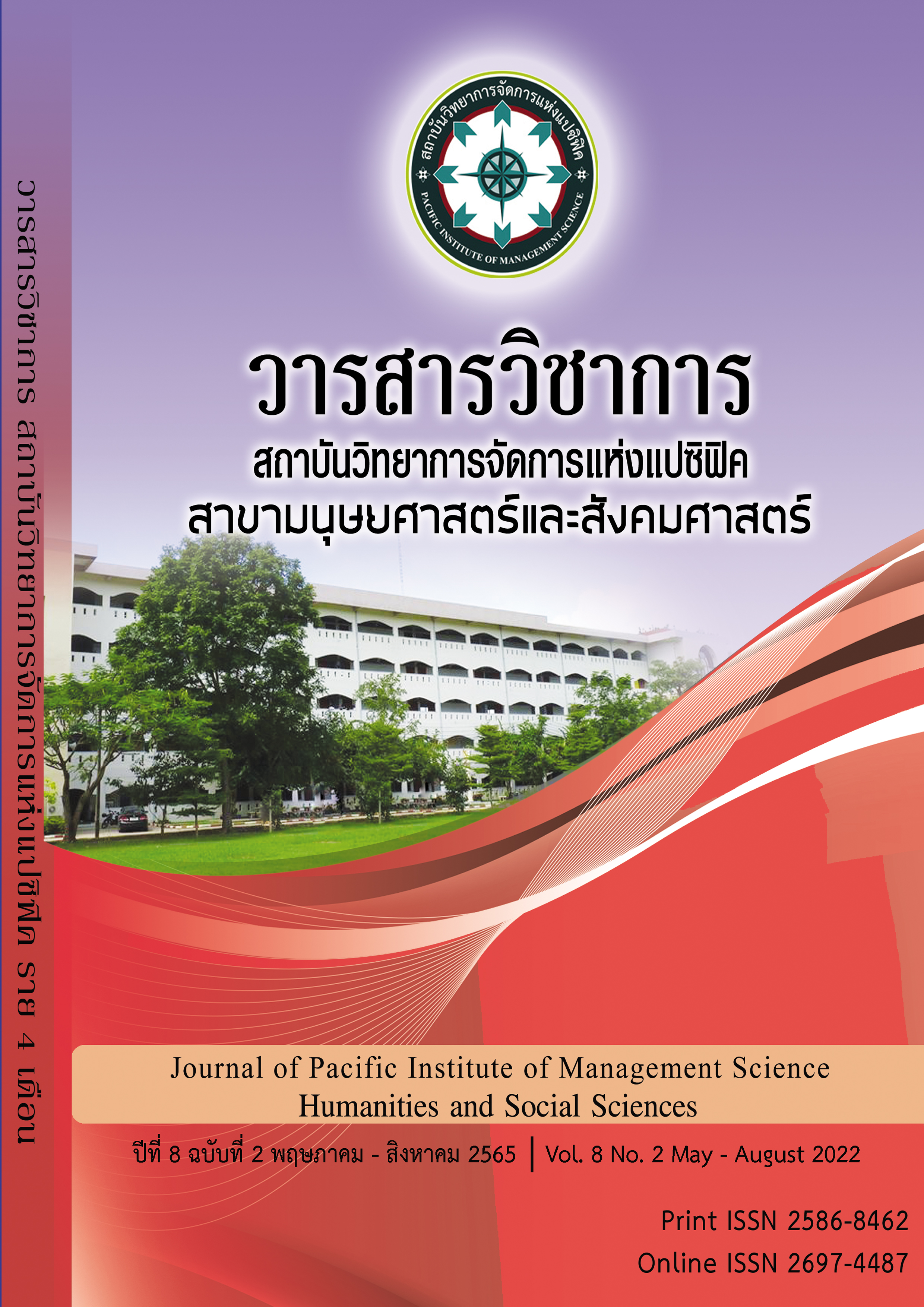The Development of Electronic Bilingual Folklore Books for the Students of Government Primary School of Intensive Islamic-studies Curriculum in Southern Border
Keywords:
Electronic books, bilingual folklore books, government school of intensive Islamic-studies curriculum in southern borderAbstract
This research aims at 1) creating and developing electronic media of bilingual folklore books, 2) investigating the effectiveness of electronic bilingual folklore books, and 3) examining the achievement of learning outcomes on ethical and moral foundations. 30 students of Parthom Three (lower primary level) from government primary school of intensive Islamic-studies curriculum in the southern borders of Thailand were the research samples, whereas the electronic bilingual folklore books, pre-test and post-test exam were the research instruments. The date was analyzed to indicate Average and SD. values, while t-test was examined for hypothesis testing. The results indicated that there are four components of creating and developing electronic bilingual folklore books in terms of ethical and moral foundations. The subject matter reflecting to ethic and moral is the first component, languages of Thai and Malay regard in the second. Figures decoration and the values together with contribution display in third and fourth component respectively. Another result reported that the effectiveness of the books is at 89.02/83.26 which is higher than the standard rate of 80/80. The last research findings revealed that learning outcomes of the students after utilizing electronic bilingual folklore books on ethical and moral foundations are higher than posttest at the statistical significance of 0.01.
References
ไกรพ เจริญโสภา. 2554. หนังสืออิเล็กทรอนิกส์ E-Book วิชาการพิมพ์ดิจิทัลสําหรับนักศึกษาปริญญาตรี มหาวิทยาลัยราชภัฏสวนสุนันทา. (รายงานการวิจัย). กรุงเทพฯ: มหาวิทยาลัยราชภัฏสวนสุนันทา.
ธนาพร ปัญญาอมรวัฒน์และอนุช สุทธิธนกูล. (2557). การพัฒนาสื่อมัลติมีเดียสําหรับการเรียนการสอนภาษาจีนพื้นฐาน. ในการประชุมวิชาการปัญญาภิวัฒน์ครั้งที่ 4 (น.34-43). กรุงเทพฯ: สถาบันการจัดการปัญญาภิวัฒน์.
ประคอง นิมมานเหมินทร์.2550.วรรณคดีท้องถิ่น.กรุงเทพฯ.โครงการเผยแพร่ผลงานวิชาการ คณะอักษรศาสตร์ จุฬามหาวิทยาลัย
ปิมปภา ร่วมสุข, ขวัญจิต ศศิวงศาโรจน์,นันทิยา ดวงภุมเมศ และขนบพร วงศ์กาฬสินธุ์. 2558. การสร้างสื่อนิทานเพื่อพัฒนาพฤติกรรมคุณธรรมด้านความมีน้ำใจในเด็กปฐมวัย. Vol. 8 No. 1 (2015): ฉบับภาษาไทย มนุษยศาสตร์ สังคมศาสตร์ และศิลปะ ( มกราคม - เมษายน 2558 )
ศิราพร ฐิตะฐาน. 2539. ในท้องถิ่นมีนิทานและการเล่น: การศึกษาคติชนในบริบททางสังคมไทย.
กรุงเทพฯ: พิฆเณศ พริ้นติ้งเซ็นเตอร์.
อำนาจ วิชยานุวัต และคณะ. 2553. การดำเนินงานการประกันคุณภาพการศึกษาของโรงเรียนในเขตพัฒนาพิเศษเฉพาะกิจจังหวัดชายแดนภาคใต้. (ทุนอุดหนุนวิจัยสำนักงานคณะกรรมการการศึกษาขั้นพื้นฐาน กระทรวงศึกษาธิการ). กรุงเทพฯ,สำนักงานคณะกรรมการการศึกษาขั้นพื้ฐาน.
Atiporn Gerdruang.2017. Empowering Learning in the 21st Century for Thailand. Society in the Digital Age.Lampang Rajabhat University Journal. ISSN 2286 – 8658 Volume 6 No.1 January - June 2017 (173-175).
Gagne, M. R., Briggs, J,L., and Wagar, W. (1974). The principles of instructional design. (4 th ed.). New York: Holt.
Siriphat Mueangkaew, Kulsirin Aphiratvoradej.2018. Development of electronic book (E-book) on Neighboring Countries Language and Culture Course for first year students in Bansomdejchaopraya Rajabhat University. CMU Journal of Education ,Vol .2 No .1 2018 (18-32)
Downloads
Published
Issue
Section
License
Copyright (c) 2022 Pacific Institute of Management Science

This work is licensed under a Creative Commons Attribution-NonCommercial-NoDerivatives 4.0 International License.
บทความที่ได้รับการตีพิมพ์เป็นลิขสิทธิ์ของ สถาบันวิทยาการจัดการแห่งแปซิฟิค
ข้อความที่ปรากฏในบทความแต่ละเรื่องในวารสารวิชาการเล่มนี้เป็นความคิดเห็นส่วนตัวของผู้เขียนแต่ละท่านไม่เกี่ยวข้องกับสถาบันวิทยาการจัดการแห่งแปซิฟิค และคณาจารย์ท่านอื่นๆในสถาบันฯ แต่อย่างใด ความรับผิดชอบองค์ประกอบทั้งหมดของบทความแต่ละเรื่องเป็นของผู้เขียนแต่ละท่าน หากมีความผิดพลาดใดๆ ผู้เขียนแต่ละท่านจะรับผิดชอบบทความของตนเองแต่ผู้เดียว







